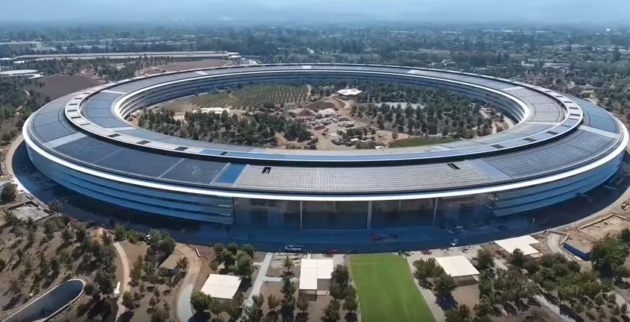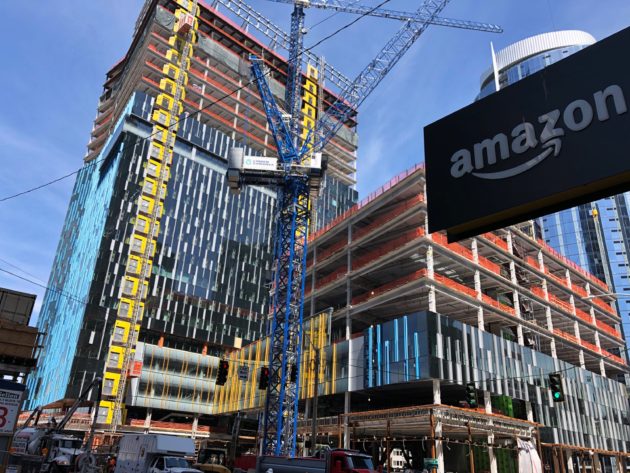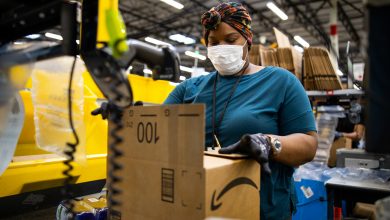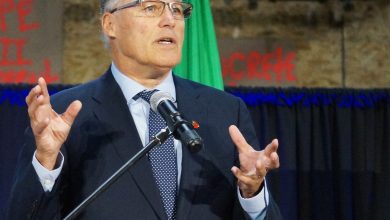How Apple’s new $2.5B housing initiative stacks up vs. Microsoft, Amazon, and other tech giants

For years, fast-growing tech companies have drawn criticism for housing crises that have swelled in Seattle, and the San Francisco Bay Area, alongside booming technology industries. Big tech companies are responding with philanthropic initiatives designed to rein in runaway housing prices and growing homelessness. Today, Apple eclipsed its peers by announcing a $2.5 billion pledge to alleviate California’s housing crisis.
Apple’s announcement comes on the heels of similar commitments from other tech giants that have had an outsized impact on the West Coast cities they call home. Microsoft was a first-mover, launching a $500 million fund in January. In the months that followed, Facebook and Google launched housing programs of their own, each valued at about $1 billion.
The housing initiatives put four of the five most valuable tech companies in the world a new role. They are becoming affordable housing financiers and government partners on one of the biggest challenges these regions face. Apple’s announcement also renders Amazon an outlier in its approach to the housing crisis that has confounded its hometown, Seattle, for years.
It’s too early to measure the impact Big Tech’s money will have on housing but already the industry is raising serious questions about who should take responsibility in cities that are becoming too expensive for many residents.
Like Microsoft’s housing pledge, Apple’s $2.5 billion initiative will be divided into several parts:
- Apple will provide a $1 billion line of credit to the State of California and other unidentified borrowers to build low- and middle-income housing “faster and at a lower cost.”
- In partnership with the state of California, Apple will use $1 billion to create a fund that provides first-time homebuyers with financing and down payment assistance.
- Apple will offer up land it owns in San Jose, estimated at $300 million, for the development of affordable housing.
- Some $200 million will go toward lower-income housing and “vulnerable populations” in the Bay Area but Apple did not detail what form that support will take.
- Apple is partnering with the Housing Trust Silicon Valley and others to launch a $150 million affordable housing fund, which will offer “long-term forgivable loans and grants.”
- A Silicon Valley non-profit called Destination: Home will receive $50 million from Apple to support its efforts to end chronic homelessness.
Apple expects the investment funds to be fully utilized in about two years. The company will invest the capital it makes on the initial funds into new housing projects over the next five years.
“Before the world knew the name Silicon Valley, and long before we carried technology in our pockets, Apple called this region home, and we feel a profound civic responsibility to ensure it remains a vibrant place where people can live, have a family and contribute to the community,” said Apple CEO Tim Cook in a statement.

In some ways, Apple’s initiative is a larger-scale version of the program Microsoft launched earlier this year. The Redmond, Wash.-based tech giant is providing $475 million in loans to affordable housing developers over three years and another $25 million in grants to nonprofits focused on homelessness. The fund is the largest pledge for a social cause in Microsoft’s history.
The Seattle region’s other tech giant, Amazon, has chosen to focus more narrowly on one piece of the bigger housing puzzle, while other companies charge ahead with more comprehensive plans. Here’s how Amazon CEO Jeff Bezos framed the issue in a 2018 interview with Business Insider:
When you go study homelessness, there are a bunch of causes of homelessness. Mental-incapacity issues are a very hard-to-cure problem. Serious drug addictions are very hard-to-cure problems. But there is another bucket of homelessness is this transient homelessness. Which is, you know, a woman with kids, the father runs away and he was the only person providing any income. They have no support system; they have no family. That’s transient homelessness. You can really help that person, and by the way, you only have to help them for six to nine months. You get them trained. You get them a job. They are perfectly productive members of society.
Helping homeless families get back on their feet has been central to Amazon’s philanthropy in this area. Amazon is opening a shelter at its corporate headquarters for homeless families in partnership with Seattle non-profit Mary’s Place in early 2020. The company has also donated space for restaurants operated by FareStart, a job-training nonprofit. Amazon estimates the collective value of its contributions to Mary’s Place and Farestart — including annual rent — to be more than $130 million.
In 2018, Bezos launched a $2 billion philanthropic initiative, with half of the funds earmarked for nonprofits that help homeless families. Amazon donated $5 million to an affordable housing fund run by Plymouth Housing in June, one of several smaller-scale housing investments the company has made in recent years.
Despite those commitments, there is a perception by some Seattle residents that Amazon has not done enough to mitigate the city’s housing crisis, which has been branded a state of emergency since 2015.
One key difference between Amazon and many of its tech industry peers is location. Bezos chose to plant Amazon’s headquarters in the center of Seattle’s urban core, making it a more visible symbol of the growing pains the city is grappling with.

Amazon’s often tense relationship with Seattle’s government also factors. The Seattle City Council attempted to raise money for affordable housing and homeless services through a new tax on big businesses last year that one councilmember branded the “Amazon Tax.” Amazon threatened to slow its growth in Seattle and the City Council abruptly repealed the tax a few weeks after passing it. Amazon has put more than $1 million behind an effort to unseat the Seattle City Council in a big election this week.
“Apple is making [2.5B investment in housing] now in part because Gov. Gavin Newsom (D) is the right partner.” From @axios. I think if Seattle had a city council that @amazon trusted, they would do the same.
— Heather Redman (@heatherredman) November 4, 2019
“Unlike its tech giant competitors in Facebook and Google, Amazon hasn’t pledged $1b to build #housing in its hometown region. Amazon hasn’t even pledged $500m like Microsoft did last yr. What Amazon has done, is funnel $1.5m into Seattle’s 2019 election.” https://t.co/3SI747TAZ5
— Teresa Mosqueda (@TeresaCMosqueda) October 25, 2019
The tech industry is under pressure to step up on housing but experts warn there are risks to becoming too dependent on private philanthropy to address the crisis. Philanthropic dollars don’t have the same oversight as public funding and they can dry up in a recession.
“Philanthropy is a great step but affordable housing is a big problem that needs a diverse range of solutions and there is no universal template that fits for each community,” said Skylar Olsen, director of economic research for Zillow, earlier this year. “Policies focused on creating more housing, in general, are beneficial, as well as those focused on providing both a supply of and access to affordable housing.”
Editor’s note: This story has been updated to correct the scheduled opening date of Amazon’s Mary’s Place shelter.
The tech industry is under pressure to step up on housing but experts warn there are risks to becoming too dependent on private philanthropy to address the crisis. Philanthropic dollars don’t have the same oversight as public funding and they can dry up in a recession.
“Philanthropy is a great step but affordable housing is a big problem that needs a diverse range of solutions and there is no universal template that fits for each community,” said Skylar Olsen, director of economic research for Zillow, earlier this year. “Policies focused on creating more housing, in general, are beneficial, as well as those focused on providing both a supply of and access to affordable housing.”
Editor’s note: This story has been updated to correct the scheduled opening date of Amazon’s Mary’s Place shelter.
Conclusion: So above is the How Apple’s new $2.5B housing initiative stacks up vs. Microsoft, Amazon, and other tech giants article. Hopefully with this article you can help you in life, always follow and read our good articles on the website: Ngoinhanho101.com





